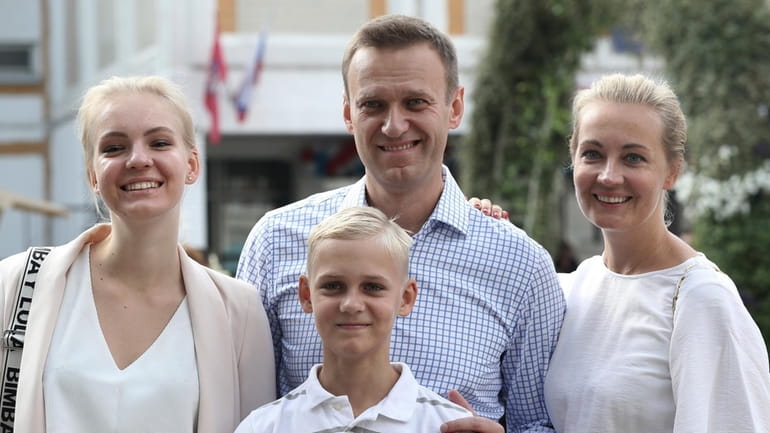Navalny offers a lesson in toughness

Russian opposition leader Alexei Navalny, with his wife Yulia, right, daughter Daria, and son Zakhar after voting during a city council election in Moscow, Russia, in 2019. Credit: AP/Andrew Lubimov
Sir Edmund Hillary was the first human to stand atop the tallest spot on Earth when he stepped onto the summit of Mount Everest on May 29, 1953, followed closely by Sherpa mountaineer Tenzing Norgay.
Their feat has lived on in our collective imagination through the decades, along with something Hillary said later:
“It is not the mountain we conquer, but ourselves.”
It is as good a definition of toughness as anyone has coined.
Hillary's insight sprang back to mind with news from Russian state media of the death of dissident Alexei Navalny. In a nation like ours that worships at the altar of toughness, we all could learn something from Navalny.
Navalny was only 47. But it certainly is no surprise that he would die in prison, given that he was long a target of Russian President Vladimir Putin, that he received a 19-year sentence after a sham trial on charges widely regarded as totally trumped, that he was subjected to harsh conditions in his confinement, and that countless other political prisoners in Russia have met similar fates.
Navalny had already set a bar for toughness.
For years, he was his country's most effective opposition leader, holding rallies against the corruption of Putin's regime that drew thousands of supporters. He faced trials and house arrests. His bank accounts were seized. And in 2020, he was poisoned with Novichok, a banned nerve agent used against other Russian dissidents in exile. Navalny barely survived, and was flown to Germany for treatment. An investigation of the poisoning implicated agents from Russia's Federal Security Service.
Despite all that, and despite being safe in Germany — as safe as one in Putin's crosshairs can be — Navalny decided to return to Russia in January 2021. The act was astounding. He knew what awaited him. He knew what the Russian justice and prison systems were like and what Putin wanted to do with him. As he said before returning to his homeland, “If they decide to kill me, it means that we are incredibly strong …” And sure enough, Navalny was detained upon his return, and never got out.
Navalny went back because his focus was on Russia's future — as he saw it, a better, freer and happier Russia. And he viewed his return — and even his likely eventual demise — as helping to achieve that goal. That is a form of toughness to which many of us can only aspire.
In this country, we tend to focus on physical toughness. We pay it homage and lionize it, in sports, politics and culture. As a nation, we recently completed six months of services in our high church of toughness — the National Football League. The NFL is a weekly homage to that human quality. Real toughness in professional football, however, might have more to do with the willingness to keep playing while knowing the long-term damage you are doing to your body and, often, your brain.
So what, really, is toughness?
Not the braying of neighborhood bullies or the posturing of dilettante politicians. Toughness is not a matter of one's bulk or volume.
For some, toughness is getting through a day, a week, a month, when life seems too difficult or one's circumstances too meager. Toughness is providing for others when the deck seems stacked against you.
Sometimes, toughness is exercising patience in a fraught situation, listening to someone and changing your mind, holding onto your beliefs amid a torrent of criticism, taking the next step forward when it seems you have nothing left to give.
Toughness is conquering your own doubts and expectations. Which sometimes leads you to do something no one else has done, like climbing a mountain, and sometimes leads you to do something no one else can imagine.
Columnist Michael Dobie's opinions are his own.

